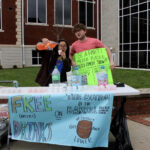The U.S. coronavirus death toll has reached over half a million merely one year after the pandemic’s steady entry into the country.
In a recent analysis done by the Kaiser Family Foundation, COVID-19 is now the leading cause of death in America, outperforming ailments and conditions such as heart disease, cancer and diabetes.
President Joe Biden desired to honor the lives of the pandemic’s victims by asking Americans to take a brief moment of silence on Feb. 22 at sunset. He also advised flags on federal property to be lowered at half-staff for five days.
The case count has experienced a 66% declination over the past month, although Jan. 12 was presumed to be the highest daily COVID-19 death rate, reaching up to 4,400 deaths. The U.S. now solidifies its placement as the country with the most coronavirus-related deaths.
With the coronavirus reaching and infecting so many people nationwide, some experts are questioning whether the U.S. will soon reach herd immunity.
Herd immunity implies that if a substantial amount of people in an environment are infected by and become resistant to the effects of a disease, then the disease is likely to die out due to its inability to spread.
According to a model developed by PHICOR, a public health research group, America could be projected to reach herd immunity as early as July.
This immunity, however, is swayed by various factors such as vaccination roll outs, fluctuation of persons affected and the possible exponential spread of the new SARS-CoV-2 variants.
With the statistics rising for vaccinated individuals, studies have found that the vaccines are starting to make a prolific difference in the case pool. In a study released on Feb. 15, “Public Health England (PHE) scientists presented preliminary data showing that the Pfizer-BioNTech vaccine appears to provide high levels of protection not only against symptomatic COVID-19 but against coronavirus infection,” according to a Washington Post article.
The Centers for Disease Control (CDC), even with the end of the winter case surge and the rollout plan in process, urges Americans to continue to follow safe COVID-19 protocols to keep the new variants from spreading as excessively as the initial form of the virus.
In accordance with the honor paid to pandemic victims, Biden delivered words of hope to those mourning their loss.
“I promise you the day will come when the memory of the loved one you lost will bring a smile to your lips before a tear to your eye,” Biden said. “It will come, I promise you.”








